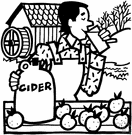cider
(redirected from cyders)Also found in: Thesaurus, Encyclopedia.
ci·der
(sī′dər)n.
1. Unfermented juice pressed from fruit, especially apples, used as a beverage or to make other products, such as vinegar.
2. An alcoholic beverage made by fermenting juice pressed from fruit, especially apples. Also called hard cider.
[Middle English sidre, hard cider, from Old French sizre, sidre, from Late Latin sīcera, intoxicating drink, from Greek sikera, of Semitic origin; see škr in Semitic roots.]
American Heritage® Dictionary of the English Language, Fifth Edition. Copyright © 2016 by Houghton Mifflin Harcourt Publishing Company. Published by Houghton Mifflin Harcourt Publishing Company. All rights reserved.
cider
(ˈsaɪdə) orcyder
n
1. (Brewing) Also called (US): hard cider an alcoholic drink made from the fermented juice of apples
2. (Brewing) Also called: sweet cider US and Canadian an unfermented drink made from apple juice
[C14: from Old French cisdre, via Medieval Latin, from Late Greek sikera strong drink, from Hebrew shēkhār]
Collins English Dictionary – Complete and Unabridged, 12th Edition 2014 © HarperCollins Publishers 1991, 1994, 1998, 2000, 2003, 2006, 2007, 2009, 2011, 2014
ci•der
(ˈsaɪ dər)n.
the juice pressed from apples, used for drinking, either before fermentation (sweet cider) or after fermentation (hard cider), or for making applejack, vinegar, etc.
[1250–1300; Middle English sidre < Old French si(s)dre < Late Latin sīcera strong drink < Greek sikera < Hebrew shēkhār]
Random House Kernerman Webster's College Dictionary, © 2010 K Dictionaries Ltd. Copyright 2005, 1997, 1991 by Random House, Inc. All rights reserved.
cider
hard cider
Dictionary of Unfamiliar Words by Diagram Group Copyright © 2008 by Diagram Visual Information Limited
ThesaurusAntonymsRelated WordsSynonymsLegend:
Switch to new thesaurus
| Noun | 1. |  cider - a beverage made from juice pressed from apples cider - a beverage made from juice pressed from applesbeverage, drinkable, potable, drink - any liquid suitable for drinking; "may I take your beverage order?" hard cider - alcoholic drink from fermented cider; `cider' and `cyder' are European (especially British) usages for the fermented beverage scrumpy - strong cider (as made in western England) sweet cider - unfermented cider |
Based on WordNet 3.0, Farlex clipart collection. © 2003-2012 Princeton University, Farlex Inc.
Translations
شَرابُ التُّفّاحعَصِير التُّفاح الـمُخَمَّر
jablečné vínojablečný moštmošt
cideræblevin
siideriomenamehu
vino od jabuke
almabor
eplasafi, eplavín
りんご酒
사과즙
sidras
sidrs
jablčný mušt
cider
น้ำแอปเปิ้ลที่มีแอลกอฮอล์
elma şarabısidr
rượu táo
Collins Spanish Dictionary - Complete and Unabridged 8th Edition 2005 © William Collins Sons & Co. Ltd. 1971, 1988 © HarperCollins Publishers 1992, 1993, 1996, 1997, 2000, 2003, 2005
Collins English/French Electronic Resource. © HarperCollins Publishers 2005
cider
n → Apfelwein m, → Cidre m; hard cider (US) → Apfelwein m (voll vergoren); sweet cider → süßer Apfelwein (teilweise vergoren), → Rauscher m (dial); rough cider → Apfelwein m (mit größerem Alkoholgehalt)
cider
:cider apple
n → Mostapfel m
cider press
n → Apfelpresse f
Collins German Dictionary – Complete and Unabridged 7th Edition 2005. © William Collins Sons & Co. Ltd. 1980 © HarperCollins Publishers 1991, 1997, 1999, 2004, 2005, 2007
Collins Italian Dictionary 1st Edition © HarperCollins Publishers 1995
cider
(ˈsaidə) noun an alcoholic drink made from apples.
Kernerman English Multilingual Dictionary © 2006-2013 K Dictionaries Ltd.
cider
→ عَصِير التُّفاح الـمُخَمَّر jablečné víno cider Apfelwein μηλίτης sidra siideri cidre vino od jabuke sidro りんご酒 사과즙 appelwijn sider cydr sidra сидр cider น้ำแอปเปิ้ลที่มีแอลกอฮอล์ elma şarabı rượu táo 苹果酒Multilingual Translator © HarperCollins Publishers 2009